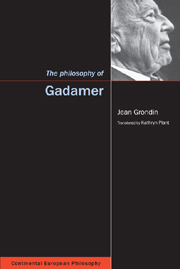Book contents
- Frontmatter
- Contents
- Abbreviations
- Translator's Note
- Introduction
- 1 The Problem of Method and the Project of a Hermeneutics of the Human Sciences
- 2 Truth after Art
- 3 The Destruction of Prejudices in Nineteenth-Century Aesthetics and Epistemology
- 4 Vigilance and Horizon in Hermeneutics
- 5 The Dialogue that We Are
- Conclusion
- Notes
- Bibliography
- Index
1 - The Problem of Method and the Project of a Hermeneutics of the Human Sciences
- Frontmatter
- Contents
- Abbreviations
- Translator's Note
- Introduction
- 1 The Problem of Method and the Project of a Hermeneutics of the Human Sciences
- 2 Truth after Art
- 3 The Destruction of Prejudices in Nineteenth-Century Aesthetics and Epistemology
- 4 Vigilance and Horizon in Hermeneutics
- 5 The Dialogue that We Are
- Conclusion
- Notes
- Bibliography
- Index
Summary
The problem of the beginning according to Rilke: where does our power to live in a world come from?
Gadamer's work opens with one of Rilke's poems, which does not fail to capture the reader's attention. It is also an issue of capture: “as long as you follow and capture only that which you yourself have initiated, it is nothing but competence and venial gain”. These words also remind us of Descartes and of his ideal of a method of knowledge thanks to which we will become the “masters and possessors of nature”. But who are we, Rilke seems to reply, to hope to master what has always captured us until now? Does true power not come from elsewhere?
Only if you suddenly capture the ball which an eternal playfellow has thrown to you alone, in the core of your being, in a fair throw, in one of the arches of God's great bridges, then only then will the ability to capture become power, but it will not be your power, it will be that of the world.
But who is this “eternal playfellow”? If only we knew! But to think we know is to become masters of our destiny once more and, eventually, to have as playfellows only ourselves, in a reflexive turning back of the cogito on itself, so that it always considers only its own thoughts. No, says Gadamer: to understand, to be able to live in a world, comes to us from an “elsewhere” over which we do not have total control.
- Type
- Chapter
- Information
- The Philosophy of Gadamer , pp. 17 - 38Publisher: Acumen PublishingPrint publication year: 2002



